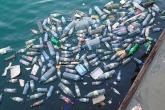Plastics industry calls for stricter European rules on imports
Producers are urging EU policymakers to support domestic market for recycling as Europe’s share of global production falls.
 Trade bodies from across the European plastics industry are calling for new EU regulations to address the challenges facing the continent’s producers and reprocessors amid a deepening recession.
Trade bodies from across the European plastics industry are calling for new EU regulations to address the challenges facing the continent’s producers and reprocessors amid a deepening recession.
The market challenge has been attributed to increased imports of non-EU recycled plastics, reduced investment in domestic production and recycling, and lack of demand for EU plastics.
New market data shows that Europe’s share of global plastics production has plummeted from 28 per cent in 2002 to 14 per cent in 2022. At the same time, the growth of recycling capacity has slowed significantly, dropping from 16 per cent in 2021 to 6 per cent in 2023.
Total EU plastics production also saw a sharp decline of 8.3 per cent in 2023, despite Europe maintaining the highest share of circular plastics relative to its total production.
Plastics Recyclers Europe (PRE) and seventeen industry trade bodies have urged immediate action to address these challenges and safeguard the future of the European plastics industry, citing the importance of promoting ‘a resilient, innovative, sustainable European plastics value chain’.
In particular, the industry coalition argues that the EU must enforce its environmental, health and safety regulations on all products and materials placed on the market, including imports. According to PRE, these measures are ‘necessary’ to ‘establish a level playing field among EU and non-EU actors’, and undo concerns about the lack of verification and traceability measures for non-EU goods.
Virginia Janssens, Managing Director of Plastics Europe, commented: “To avoid a worrying slowdown in Europe’s transition we need urgent measures to make investments in circular plastic production more attractive, reduce red tape for instance due to excessively long permitting procedures and create a level playing field with our international competitors.”
Calls for regulation
With the 2024-29 legislature having opened in July, stakeholders are urging EU policymakers to prioritise measures that prevent further de-industrialisation and work towards establishing a Single Market for waste and recycled plastics.
The main solution proposed is the establishment of an EU-wide incentive scheme to boost investment in circular solutions, as well as implementing best practices across all Member States.
PRE warns that a lack of action now could risk the EU losing its leadership in plastic production and recycling innovation, as well as jeopardising its ability to meet its 2030 environmental legal framework commitments.
These concerns come in the wake of the failure to reach consensus on a global treaty to combat plastic pollution at the fifth session of the Intergovernmental Negotiating Committee (INC-5), which was hindered by disagreements between major plastic-producing nations.






